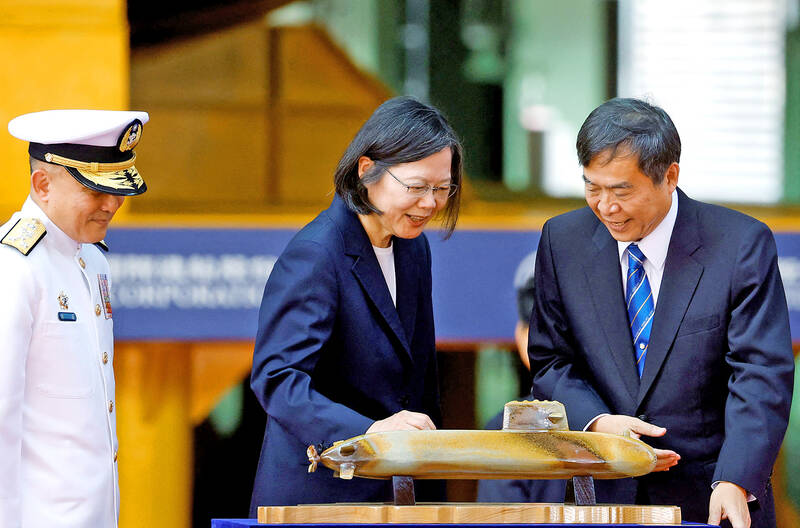President Tsai Ing-wen (蔡英文) yesterday presided over the launch of the nation’s first domestically made submarine, called Hai Kun (海鯤), or Narwhal, or at a ceremony in Kaohsiung, calling the event a crucial moment in Taiwan’s mission to produce domestic subs and achieve “defense autonomy.”
The ceremony was held at a CSBC Corp, Taiwan (台灣國際造船) shipyard, the contractor for the nation’s Indigenous Defense Submarine (IDS) project.
“Today will go down in history,” Tsai said in her remarks.

Photo: EPA-EFE / Presidential Office
Building an IDS used to be considered “mission impossible,” but it is now a reality, she added.
Saying that submarines are crucial in the navy’s efforts to develop asymmetric combat capabilities and other key strategies, Tsai hailed the occasion as a landmark in the nation’s bid to achieve “defense autonomy.”
The IDS prototype has the pennant number “711” and an X-shaped rudder, instead of a cross-shaped rudder seen on previous models, which according to CSBC Corp, Taiwan chairman Cheng Wen-lon (鄭文隆) gives it an edge over Taiwan’s other submarines in active service.

Photo: Carlos Garcia Rawlins, Reuters
Asked why the ship was named Hai Kun, Navy Command said that Taiwan was once called “Kun Island.”
Kun is the name of a “gigantic” fish in the first chapter of Zhuangzi titled “Free and easy wandering” (逍遙遊), it said.
Kun also connotes “stealth” and “hard to detect” motions, it said
The submarine would be able to move far and wide, and thus provide naval deterrence to better protect the nation, it said.
The number 711 symbolizes “cross-generation” and “superb excellence,” it added.
Also in attendance at the ceremony were IDS program convener Huang Shu-kuang (黃曙光), American Institute in Taiwan Director Sandra Oudkirk, Minister of National Defense Chiu Kuo-cheng (邱國正) and Kaohsiung Mayor Chen Chi-mai (陳其邁).
Only the bow of the submarine was exposed at the ceremony, with the torpedo tubes and other critical components covered with a national flag.
Huang on Monday said that after the launch ceremony, the IDS prototype is to undergo a harbor acceptance test on Sunday, followed by a sea acceptance test, and hopefully would be delivered to the navy before the end of next year.
The IDS program aims to build another submarine by 2027.
Both submarines are to be deployed to defend the waters around Taiwan, and the area from Suao Township (蘇澳) in Yilan County to near Yonaguni Island in Japan’s Okinawa Prefecture, Huang said.
The building of domestic submarines means Taiwan’s navy will have three combat-ready submarines by 2025 and four by 2027, including two existing Chien Lung-class (Sword Dragon) submarines bought from the Netherlands in the 1980s.
Taiwan also has two World War II-vintage subs purchased from the US in the 1970s, which are now only used for training.

INVESTIGATION: The case is the latest instance of a DPP figure being implicated in an espionage network accused of allegedly leaking information to Chinese intelligence Democratic Progressive Party (DPP) member Ho Jen-chieh (何仁傑) was detained and held incommunicado yesterday on suspicion of spying for China during his tenure as assistant to then-minister of foreign affairs Joseph Wu (吳釗燮). The Taipei District Prosecutors’ Office said Ho was implicated during its investigation into alleged spying activities by former Presidential Office consultant Wu Shang-yu (吳尚雨). Prosecutors said there is reason to believe Ho breached the National Security Act (國家安全法) by leaking classified Ministry of Foreign Affairs information to Chinese intelligence. Following interrogation, prosecutors petitioned the Taipei District Court to detain Ho, citing concerns over potential collusion or tampering of evidence. The

‘FORM OF PROTEST’: The German Institute Taipei said it was ‘shocked’ to see Nazi symbolism used in connection with political aims as it condemned the incident Sung Chien-liang (宋建樑), who led efforts to recall Democratic Progressive Party (DPP) Legislator Lee Kun-cheng (李坤城), was released on bail of NT$80,000 yesterday amid an outcry over a Nazi armband he wore to questioning the night before. Sung arrived at the New Taipei City District Prosecutors’ Office for questioning in a recall petition forgery case on Tuesday night wearing a red armband bearing a swastika, carrying a copy of Adolf Hitler’s Mein Kampf and giving a Nazi salute. Sung left the building at 1:15am without the armband and apparently covering the book with a coat. This is a serious international scandal and Chinese

Seventy percent of middle and elementary schools now conduct English classes entirely in English, the Ministry of Education said, as it encourages schools nationwide to adopt this practice Minister of Education (MOE) Cheng Ying-yao (鄭英耀) is scheduled to present a report on the government’s bilingual education policy to the Legislative Yuan’s Education and Culture Committee today. The report would outline strategies aimed at expanding access to education, reducing regional disparities and improving talent cultivation. Implementation of bilingual education policies has varied across local governments, occasionally drawing public criticism. For example, some schools have required teachers of non-English subjects to pass English proficiency

TRADE: The premier pledged safeguards on ‘Made in Taiwan’ labeling, anti-dumping measures and stricter export controls to strengthen its position in trade talks Products labeled “made in Taiwan” must be genuinely made in Taiwan, Premier Cho Jung-tai (卓榮泰) said yesterday, vowing to enforce strict safeguards against “origin laundering” and initiate anti-dumping investigations to prevent China dumping its products in Taiwan. Cho made the remarks in a discussion session with representatives from industries in Kaohsiung. In response to the US government’s recent announcement of “reciprocal” tariffs on its trading partners, President William Lai (賴清德) and Cho last week began a series of consultations with industry leaders nationwide to gather feedback and address concerns. Taiwanese and US officials held a videoconference on Friday evening to discuss the